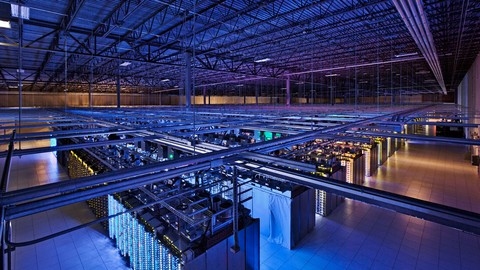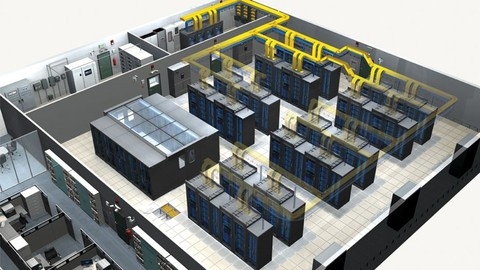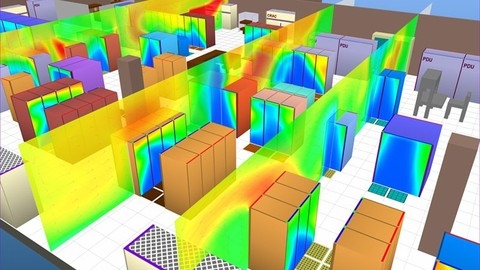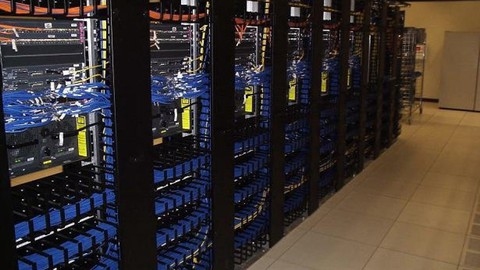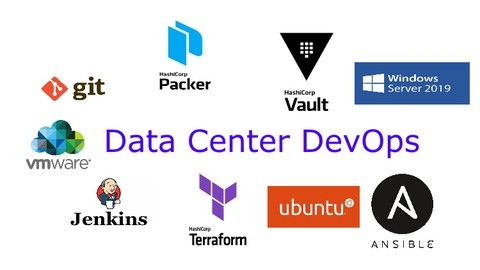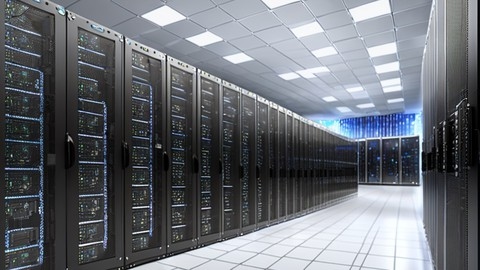Data centers are the beating heart of modern technology, housing the servers, networks, and storage infrastructure that power our digital world.
Understanding how data centers operate is crucial for IT professionals, aspiring system administrators, and anyone interested in the inner workings of the internet.
By learning about data center essentials, you can gain valuable skills in network design, power management, cooling systems, and security, setting yourself up for exciting opportunities in the rapidly evolving field of IT.
Finding a good data center course on Udemy can be a challenging task.
With so many options available, it’s easy to feel overwhelmed and unsure which course will provide the best value for your time and money.
You want a course that is comprehensive, engaging, and taught by experienced professionals who can guide you through the complexities of data center operations.
Based on our in-depth analysis, Data Center Essentials: General Introduction stands out as the best overall data center course on Udemy.
This course provides a strong foundation in data center fundamentals, covering essential concepts like power distribution, cooling systems, and security measures.
The instructor delivers clear explanations and practical examples, making learning engaging and easy to understand.
This is just one of many great data center courses available on Udemy.
To find the perfect course for your learning style and career goals, keep reading to explore our comprehensive list of recommendations and discover the best resources to advance your data center knowledge.
Data Center Essentials: General Introduction
This course provides a solid foundation in the fundamentals of data center operation.
You’ll gain a comprehensive understanding of how data centers function, from the core principles of reliability and redundancy to the critical components that ensure seamless operation.
You’ll explore the essential elements of a data center’s infrastructure, including power distribution, cooling systems, and data hall design.
The course delves into the intricacies of data center security, covering fire detection and suppression systems, water storage, and access control measures.
You’ll learn about the various types of IT systems and deployment strategies commonly employed within data centers.
While the course offers a broad overview, it would benefit from greater depth in specific areas.
For example, exploring the latest trends in data center technologies and security practices would enhance its relevance for professionals seeking to stay ahead of the curve.
Additionally, case studies and real-world examples would further illustrate the practical applications of the concepts discussed.
It provides a comprehensive introduction to the key aspects of data center design, implementation, and management.
However, to maximize its impact, it could benefit from a more focused exploration of current trends and practical applications.
Data Center Essentials: Power & Electrical
This course delves into the critical world of data center electrical systems, equipping you with a strong foundation in the power infrastructure that keeps these facilities running smoothly.
You’ll gain a deep understanding of the essential electrical components and how they interact, starting with fundamental concepts like voltage and conductors and progressing to complex systems like uninterruptible power supplies (UPS).
You’ll begin with a clear overview of the electrical demands of a data center, learning about standard voltages and the various components used to deliver power, including power distribution units.
You’ll gain a detailed look at UPS systems, their role in providing backup power during outages, and how they ensure continuous operation.
The course doesn’t stop at the basics.
You’ll dive into the specific types of conductors, conduits, and breakers used in data center environments.
You’ll learn about the different sizing and materials used for each, as well as the principles behind choosing the appropriate type of switch for different applications.
Data Center Essentials: Mechanical & Cooling
This course offers a comprehensive exploration of data center mechanical systems, focusing on the crucial role of cooling in maintaining these critical facilities.
You’ll begin with a strong foundation in data center mechanical fundamentals, gaining a deep understanding of air conditioning principles and the diverse design approaches employed for effective cooling.
You’ll then delve into the fascinating world of computational fluid dynamics, learning to analyze and predict airflow patterns within data centers – a valuable skill for optimizing system efficiency and reliability.
The course continues with a detailed exploration of water cooling systems, examining their design, operation, and maintenance.
You’ll gain a nuanced understanding of the critical role water cooling plays in preventing overheating and ensuring the long-term stability of data center operations.
By completing this course, you’ll emerge with a robust knowledge of data center mechanical systems, equipped to analyze and optimize airflow, ensuring the efficient and reliable operation of these vital facilities.
This comprehensive understanding equips you with the skills and knowledge necessary to excel in the demanding field of data center management.
Data Center Infrastructure Design - An Introduction
This course provides a solid foundation in data center infrastructure design, covering the essential components and principles that underpin a well-functioning facility.
You’ll delve into the critical aspects of power distribution, cooling systems, and network cabling, gaining a clear understanding of their interconnected roles.
The course emphasizes the importance of airflow management, demonstrating how it directly impacts data center efficiency and performance.
You’ll explore the nuances of copper and optical fiber cabling, learning how to manage these vital connections effectively.
One of the course’s strengths is its practical approach to learning.
You’ll encounter real-world scenarios and apply the concepts you’ve learned to realistic situations.
The course also includes a comprehensive review quiz, allowing you to test your understanding and solidify your knowledge.
Whether you’re a network administrator, IT professional, or anyone seeking a comprehensive introduction to data center design, this course offers a valuable starting point.
You’ll gain the knowledge needed to understand the intricate workings of these critical facilities and confidently navigate the challenges of modern data center infrastructure.
Python for Network Engineers - Data Center Use Cases
You’ll start with the fundamentals of Python, building a solid foundation in coding, working with data structures, and developing basic programs.
The instructor guides you through two practical projects, giving you immediate experience in applying your new skills.
The second half of the course dives deep into programmability and APIs, the key to automating your network infrastructure.
You’ll learn industry-standard protocols like NETCONF and RESTCONF, and explore vendor-specific APIs like Arista’s eAPI and Cisco’s NX-API.
This section equips you with the tools to configure and manage network devices, automate tasks like zero-touch provisioning, and even integrate with Kubernetes for powerful F5 BIG-IP automation.
The course culminates with in-depth explorations of MLAG and VXLAN, two critical technologies for modern data center networks.
You’ll learn how to configure and manage these technologies using Python, giving you the ability to scale and optimize your network efficiently.
You’ll also gain hands-on experience with a real data center lab environment, allowing you to apply these skills in a practical setting.
This course isn’t just for beginners.
Experienced network engineers will find valuable insights and practical applications for automating complex tasks.
Data Center DevOps: On-Prem Infrastructure Like The Cloud
You’ll gain practical experience with a suite of powerful tools, including Docker, Terraform, Ansible, and Packer.
Start by mastering the fundamentals of containerization with Docker and establishing a robust source control system using GOGS and Vault.
These tools lay the foundation for effectively managing code and infrastructure changes throughout the course.
You’ll then delve into VM automation with Packer, learning to create standardized templates for both Ubuntu 20 and Windows Server 2019.
Next, you’ll explore the capabilities of Jenkins, a popular automation server, and leverage it to build and configure VMs.
This will equip you to streamline your DevOps workflows.
You’ll then dive into Terraform, the industry standard for infrastructure as code.
Through hands-on exercises, you’ll deploy Ubuntu 20 and Windows Server 2019 VMs using Terraform and seamlessly integrate it with Jenkins for end-to-end infrastructure management.
Finally, you’ll master Ansible, a configuration management tool that automates tasks across your infrastructure.
Learn to configure VMs with Ansible playbooks, ensuring consistency and efficiency in your deployments.
Data Center Cabling Design Course
This Data Center Cabling Design Course provides a comprehensive and practical introduction to the world of data center cabling.
You’ll gain a strong understanding of the key standards and explore various cabling topologies, gaining valuable insights into the design considerations that ensure efficient and reliable data center infrastructure.
The course goes beyond theory by walking you through the practical aspects of cabling design.
You’ll learn about different cabling pathways, including backbone and horizontal cabling, and acquire hands-on knowledge of proper cable installation techniques.
The inclusion of field testing methods ensures you’re equipped to verify the integrity of your cabling solutions.
Beyond the technical aspects, you’ll learn the importance of cabling administration, including proper documentation and maintenance practices.
This ensures that your data center infrastructure remains organized, efficient, and compliant with industry best practices.
The course culminates in a thorough final exam that assesses your understanding of the material.
This comprehensive exam utilizes a variety of question formats, including single-choice, multiple-choice, and technology-enabled questions, to provide a realistic evaluation of your skills.
This course is a valuable resource for anyone seeking to develop a strong foundation in data center cabling design, whether you’re a network administrator, IT professional, or anyone interested in understanding the critical role of cabling in today’s data centers.
